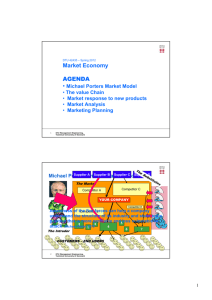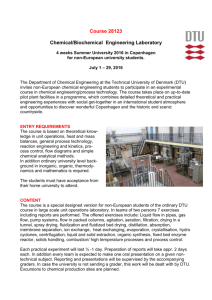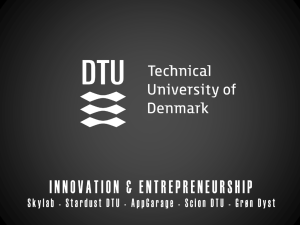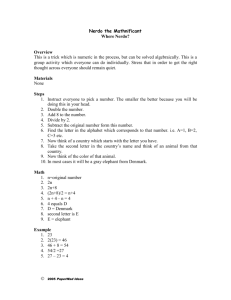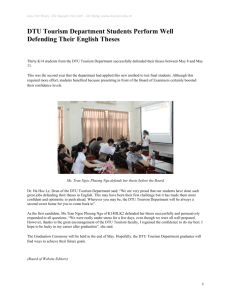Information and communication technologies
advertisement
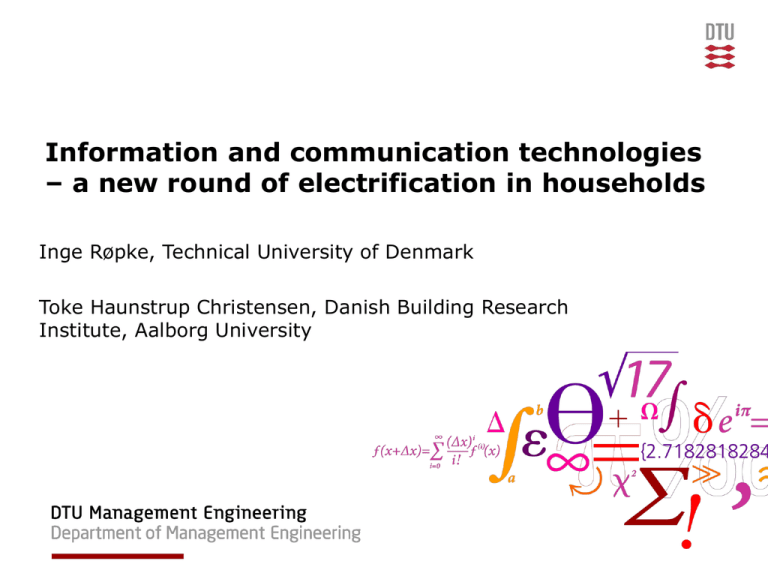
Information and communication technologies – a new round of electrification in households Inge Røpke, Technical University of Denmark Toke Haunstrup Christensen, Danish Building Research Institute, Aalborg University Motivation: Old and new environmental impacts of everyday life • Studies tend to focus on: Which parts of consumption are most problematic in an environmental perspective here and now? • Calls for studies on food (e.g. meat), transport and housing (heating, cooling, white goods) • Fine! But: where do the new threats come from? What happens behind our backs while we are dealing with the old problems? New problems are constructed Not the least: in relation to ICT and the internet infrastructure 2 DTU Management Engineering, Technical University of Denmark COST 298: Users of social networks 14/05/2009 Outline Summarize a project: The use of ICT in Danish households in an energy perspective •Data •Three observations – and what they tell about habits and routines •Implications for electricity consumption •A new round of electrification of households •Indirect energy consumption •Rounding up 3 DTU Management Engineering, Technical University of Denmark COST 298: Users of social networks 14/05/2009 Project: The use of ICT in Danish households in an energy perspective • In-depth interviews 2007-8 • Focus on emerging trends: people who have long experience with ICT and competence to take up new applications • 14 main informants, 3 partners, additional telephone interviews. Adults: 25-75 years • Forms with background information: – Equipment of the household (40 types) – The use of ICT in relation to 48 activities, organized in 10 groups • Three points: – Pervasiveness – User creativity – Diversification 4 DTU Management Engineering, Technical University of Denmark COST 298: Users of social networks 14/05/2009 Pervasive integration in everyday practices • ICTs support the universal activities of communication, search for information and shopping – which are integrated aspects of almost all practices in modern societies • Work and education – Teleworking, distance learning, home office, video conferences • Reproductive work – Shopping, banking, public services, health, the intelligent home, security, child care, cooking, do-it-yourself, ICT maintenance • Leisure – Social communication, entertainment, games, creativity, documentation, hobbies, gambling, sex • Civil society – Organizations, politics 5 DTU Management Engineering, Technical University of Denmark COST 298: Users of social networks 14/05/2009 Mary is a coach in the local karate club, training a children’s team Communicates with the parents through email Contributes to the club’s website Finds inspiration at websites of other clubs 6 DTU Management Engineering, Technical University of Denmark COST 298: Users of social networks 14/05/2009 Esben is a member of a rifle club He has a safe for keeping weapons for the club. A webcamera is installed in the room with the safe. Images are sent to Esben’s mobile in case anything moves 7 DTU Management Engineering, Technical University of Denmark COST 298: Users of social networks 14/05/2009 Several informants have running computers Measuring distance and gradients of the route, and monitoring the speed and pulse of the user Mikkel uses a net-based route map to plan new routes and measure the length 8 DTU Management Engineering, Technical University of Denmark COST 298: Users of social networks 14/05/2009 Merete takes lessons in line dance On YouTube she finds films with instructions 9 DTU Management Engineering, Technical University of Denmark COST 298: Users of social networks 14/05/2009 Lise rides her horse every day and will soon buy one more horse Lise and her husband are renovating the stable She plans for webcameras in stable and fold and a website to access the recordings over the net Then she can monitor the horses without going out at night And she can watch them at her workplace and decide to go home early in case of bad weather 10 DTU Management Engineering, Technical University of Denmark COST 298: Users of social networks 14/05/2009 Benny sings in a choir, records the concerts of the choir and edits the results Sometimes he burns a CD and discusses the music with others Brian (retired) is responsible for the website of his choir Merete’s choir has a Facebook group where the music is available She also uses YouTube to search for the songs 11 DTU Management Engineering, Technical University of Denmark COST 298: Users of social networks 14/05/2009 Helle is interested in genealogy. Her cousin made a website where family members upload information. She uses data bases, incl. the church registers which are scanned and made available on the net 12 DTU Management Engineering, Technical University of Denmark COST 298: Users of social networks 14/05/2009 Mary logs on to the internal pages of her daughter’s class almost every day to see what homework is set for the pupils 13 DTU Management Engineering, Technical University of Denmark COST 298: Users of social networks 14/05/2009 John has a copy of his home in Second Life. The avatar can turn the light off and on in the real home. 14 DTU Management Engineering, Technical University of Denmark COST 298: Users of social networks 14/05/2009 Diversification of well-known practices: The range of ways to keep in contact • Meeting, phone calls, letters • Mobile phone; text and picture messages • Skype / IP telephony; video-phoning • Email • Instant messaging (Messenger, Google Talk, Facebook’s instant messaging service) • Facebook, MySpace, LinkedIn… • Blogs; travel blogs • Web-based photo albums • Online games 15 DTU Management Engineering, Technical University of Denmark COST 298: Users of social networks 14/05/2009 Habits and routines do not seem difficult to change – in an environmentally problematic direction 16 DTU Management Engineering, Technical University of Denmark COST 298: Users of social networks 14/05/2009 Implications for direct electricity consumption • At least one computer per person. Many have more • It is not practical to turn off the computer • Room and activity specific computers • Specialized equipment for many practices • Mobile equipment ever more important • Potential for energy savings: improved monitoring (increased awareness of energy consumption) and intelligent management. Still only a minor modification of the general picture 17 DTU Management Engineering, Technical University of Denmark COST 298: Users of social networks 14/05/2009 A new round of the electrification of households • Ligthing • Power and heating • Broadcasting • Data-processing (monitoring, management) • Combined with at new infrastructure: interactive network 18 DTU Management Engineering, Technical University of Denmark COST 298: Users of social networks 14/05/2009 Electricity consumption 1946-2006 The distribution of household electricity consumption among final uses 1946-2006 100% 80% 60% 40% 20% 0% 1946 1951 1956 1961 1966 1971 1976 1981 1986 1991 1996 2001 2006 Lighting 19 Cooling Heating DTU Management Engineering, Technical University of Denmark Cooking Laundry TV, music and computer COST 298: Users of social networks Miscellaneous 14/05/2009 Basic function Basic technology Transmission of sound Telephone (by wire) Lighting Electric bulb Heating Heating element Powering Consumer products New infrastructure Telephone Telephone network Electric bulb Electricity network Electric iron Electric cooker Electric heater for water Toaster ... Vacuum cleaner Sewing machine Refrigerator Washing machine Food processor ... Playing of stored Media for recording and Gramophone sound (later images) reproduction Tape recorder ... Wireless transmission Vacuum tube Radio and broadcasting Television Data-processing Transistor Personal computer Interactivity Microchip Internet access Accessibility Computers in network Mobile devices 20 Small electromotor DTU Management Engineering, Technical University of Denmark + Broadcasting networks + Internet backbone net and various access networks COST 298: Users of social networks 14/05/2009 Implications for indirect energy consumption • Production and disposal of equipment – Particularly important for devices with a short lifetime • Running of the ICT-related infrastructure – E.g. increased data transmission and bandwidth add to energy consumption • Based on literature survey: – When 1 kWh is consumed in the residence, – 1 kWh is consumed to manufacture, transport and dispose of the hardware – ½ kWh is consumed to run the internet and the ICT infrastructure outside the residence • Derived energy impacts – Complexity, unresolved – In case they are positive: do not necessarily justify the negative impacts 21 DTU Management Engineering, Technical University of Denmark COST 298: Users of social networks 14/05/2009 ”The broadband society” involves quite radical transformations • Potential for transforming most everyday practices • Dramatic implications for energy use • Comparable to the establishment of the car society – or even more radical? • Two dominant social agendas develop in relative isolation – Preventing climate change (and other environmental problems) – Promoting ”the broadband society” (sometimes associated the concept of ”dematerialization”) • Can the agendas meet? 22 DTU Management Engineering, Technical University of Denmark COST 298: Users of social networks 14/05/2009 Thank you for your attention! 23 DTU Management Engineering, Technical University of Denmark COST 298: Users of social networks 14/05/2009
